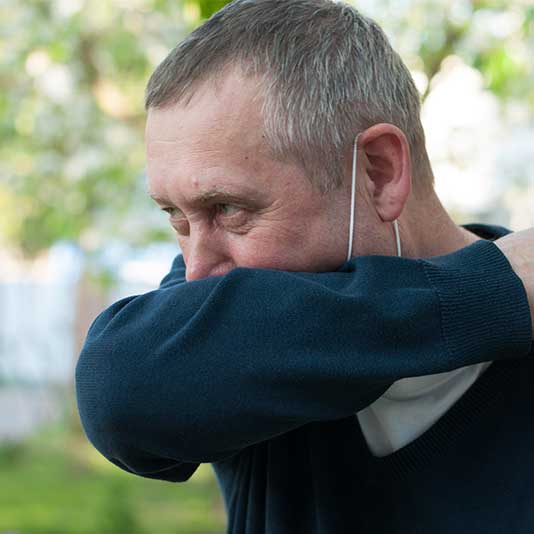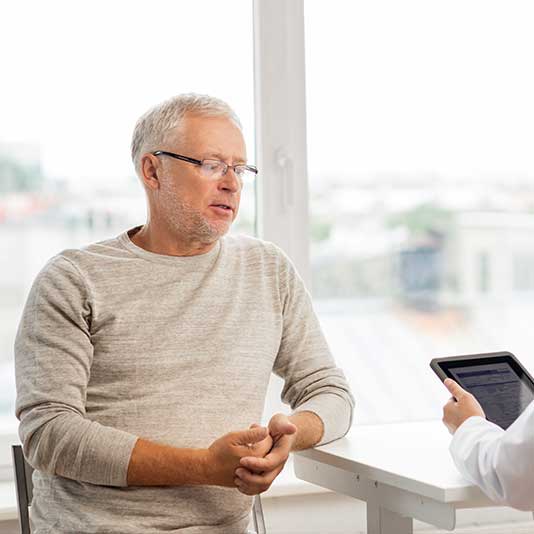Common cancers facing adults in the UK
Cancer is everywhere. Whether you turn on the news, watch television, listen to the radio or browse social media, it’s almost impossible to avoid the topic of cancer – a disease which affects almost 1 in 2 people in the UK1.
While there are more than 200 different cancers, the most common cancers affecting people in the UK are breast, lung, prostate and bowel cancer1,2. Early detection and diagnosis are critical in the fight against cancer. Cancer that is diagnosed at an early stage is more likely to be treated successfully.
In this article, we’ll look at some of the most common cancers in the UK, their risk factors, early detection, what you should do if you’re worried and more.
But first…
Having a risk factor doesn’t mean that you will definitely develop that cancer. Similarly, not having risk factors doesn’t mean that you definitely won’t get cancer. Some risk factors can be controlled, so it helps to be aware of them.
Breast cancer
Breast cancer is the most common cancer in the UK, and 1 in 7 females will be diagnosed with the disease in their lifetime3. Fortunately, there are now more treatment options for breast cancer than ever before.
Risk factors of breast cancer
There are a variety of risk factors for breast cancer, including4:
getting older - most breast cancers occur in people over the age of 50
a family history of breast cancer or carrying specific genes
your ethnicity - reports have found that breast cancer is more common in white women than in any other ethnic group
being overweight/obese
drinking alcohol
taking the contraceptive pill or HRT.
Breast cancer in male-born people is rare, but it can happen. Research from Cancer Research UK suggests that around 56,400 women and 390 men are diagnosed with breast cancer in the UK each year4.
Symptoms of breast cancer in women
For most women, the first symptom of breast cancer is a lump or thickening in their breast or armpit5. Other symptoms include:
a change in the size, shape or feel of your breast
changes in the skin of your breast, like redness or dimpling
a change in the size or shape of one breast
changes to your nipple including crusting or leaking
pain in your breast or armpit which doesn’t go away.
Symptoms of breast cancer in men
The NHS shared the following symptoms for breast cancer in men6:
a lump or swelling in the chest or armpit
liquid leaking from your nipples which may have blood in it
a change in the size or shape of your chest
sores or ulcers on your chest
a change in the shape or look of your nipple, such as it turning inwards or a rash on it.
A breast lump doesn’t mean you definitely have cancer!
There are some types of non-cancerous breast lumps too7. Nevertheless, if you experience any symptoms, make an appointment with your NHS GP as there will need to be a physical examination.
Breast screening
Breast screening (mammogram) is the best way to detect breast cancer. Anyone registered with a GP as female will be invited for NHS breast screening every 3 years between the ages of 50 and 71. If you don’t get a letter inviting you, speak to your GP or local breast screening service8. You may also be offered a diagnostic mammogram if you have any symptoms of breast cancer. Your Simplyhealth membership may include access to fast, discounted private scans via our partner, scan.com, which can be booked without a clinical referral.
Breast self-examination
Regular self-examination is one of the best ways of getting to know your breast/chest so that you can spot any changes earlier. Here’s how.

What to expect if you are diagnosed with breast cancer
We know that being diagnosed with cancer is an emotional rollercoaster and it can feel extremely overwhelming and stressful. Fortunately, there’s plenty of support available. Your doctor will be able to explain what your diagnosis means and what your treatment options are, as well as answering all the questions that you have.
There’s plenty of available support online, including Breast Cancer Now, Coppafeel (for women under 40 diagnosed with Breast Cancer), and MacMillan cancer support. Your healthcare team should also be able to signpost you to any local support networks. At Simplyhealth, we also provide mental health support as part of our health plans, so there’s someone to speak to in the moment.
Lung cancer
Around 48,500 new cases of lung cancer are diagnosed every year9. Around 79% of lung cancer cases are said to be preventable9.
Risk factors for lung cancer
Smoking cigarettes is responsible for more than 7 out of 10 cases of lung cancer, making it the single biggest risk factor for the disease10.
If you smoke more than 25 cigarettes per day, you are 25 times more likely to get lung cancer than someone who doesn’t smoke10.
Lung cancer risk is linked to all tobacco products including cigars, pipe tobacco, snuff and chewing tobacco. Smoking cannabis that’s mixed with tobacco and frequent exposure to other people’s tobacco smoke could also increase your risk.

Symptoms of lung cancer
There’re not usually any symptoms of lung cancer in the early stages of the disease. However, as it progresses, the main signs include11:
a cough that doesn’t go away after three weeks
a long-standing cough that gets worse
repeated chest infections
coughing up blood
aches or pains when breathing or coughing
persistent breathlessness
tiredness/lack of energy
loss of appetite/unexplained weight loss
These can also be signs of other health conditions, but it’s important that you speak to your GP if you notice any of these symptoms.
Lung cancer screening
In the UK, there’s a new lung cancer screening programme in development. When it’s rolled out fully, anyone aged between 55 and 74 who smokes or used to smoke will be invited for assessment. In the meantime, if symptoms are present, diagnostic imaging is available through scan.com as part of your Simplyhealth Health Plan.
What to expect if you are diagnosed with lung cancer?
Getting a lung cancer diagnosis can be an extremely anxious time. Your doctor will be able to explain what your diagnosis means and what treatment is available. Don’t be afraid to ask any questions you may have.
You can also find support online. Check out The Roy Castle Lung Cancer Foundation, and Asthma and Lung UK. You can also contact Macmillan Cancer Support. Your healthcare team will be able to signpost you to any local support networks too.
Prostate cancer
More than 52,000 men or male-born people are diagnosed with prostate cancer every year in England12. The prostate is a walnut-sized gland that grows bigger as you get older. It’s found under the bladder and its main job is to help make semen. When diagnosed early, patient outcomes for prostate cancer are usually very good13.
Prostate cancer risk factors
Prostate cancer most commonly affects people aged between 75-79 years old, but it can occur at any age12. Some other risk factors for the disease include14:
ethnicity – it’s more common if you’re black, and least common if you’re of Asian descent
a close family member has had the disease
you have certain genes
you are overweight or obese.

Symptoms of prostate cancer
Most cases of prostate cancer develop slowly, and symptoms often aren’t obvious until the disease has progressed enough to affect the urethra: the tube that carries urine out of your body.
Common symptoms of prostate cancer include15:
an increased need to pee, often during the night
straining while you pee
feeling like your bladder hasn’t properly emptied
blood in the urine.
These symptoms can also be signs of an enlarged, non-cancerous prostate too15.
Currently, there isn’t a national screening programme for prostate cancer as there’s no test reliable at picking it up in its early stages. If you have concerns about prostate cancer, or if you’re experiencing symptoms, visit your own NHS doctor.
What to expect if you are diagnosed with prostate cancer?
Being diagnosed with prostate cancer can cause fear, confusion and anxiety. Your doctor will be able to explain what your diagnosis means and what treatment they recommend, as well as answering your questions.
Fortunately, you can also find support online from Prostate Cancer UK and Zero Prostate Cancer. You can also contact Macmillan Cancer Support. You can ask your healthcare team if there are any local organisations that can help too.
Bowel cancer
Bowel cancer is the fourth most common cancer in the UK, and around 43,000 people are diagnosed with the disease every year. It’s treatable and curable, especially if diagnosed early16.
Risk factors for bowel cancer
Bowel cancer is more common in older people, with more than 40% of cases diagnosed in people over the age of 7517.
Some of the key risks of bowel cancer include17:
your diet, specifically eating too much red and processed meat, and eating too little fibre
being overweight/obese
not getting enough exercise
drinking alcohol
smoking
a family history of the condition
a diagnosis of ulcerative colitis or Crohn’s disease.
You could help to reduce your risk of bowel cancer by swapping red and processed meat for chicken, fish, beans or pulses, and by increasing the amount of fibre in your diet. You can do this by swapping white bread and rice for brown, choosing wholegrain breakfast cereals and eating more fruit and vegetables that are high in fibre, such as peas and raspberries17.
Bowel cancer symptoms
There are a wide range of symptoms associated with bowel cancer, including18:
changes in your poo, such as experiencing diarrhoea or constipation regularly that’s not normal for you
needing to poo more or less often than usual
blood in your poo, which may appear red or black
bleeding from your bottom
often feeling like you need to poo even if you’ve just been
tummy pain
a lump in your tummy
bloating
unexplained weight loss.
Bowel cancer screening
NHS Bowel cancer screening checks are currently available to everyone aged between 60 and 74 years old, although it’s currently expanding to gradually include everyone over the age of 50. It involves a home testing kit where you take a small sample of your poo and send it to lab. If you’re registered with an NHS GP, you should be sent a bowel cancer screening kit every two years. However, if you’re concerned about bowel cancer at any age, don’t wait for screening and make an appointment with a doctor straight away.
What to expect if you are diagnosed with bowel cancer
A bowel cancer diagnosis will always be a stressful and emotional time. Your doctor will take the time to explain what your diagnosis means and what treatment you can be offered. Don’t forget to ask as many questions as you need too.
There’s support available online from a range of organisations, including Bowel Cancer UK. You can also contact Macmillan Cancer Support. Your healthcare team should be able to direct you to any local support groups as well.

Final thoughts
You’ll probably have noticed that some of the risk factors for the cancers featured in this article are the same. The good news is that understanding these could help you make positive lifestyle changes, such as adopting a healthy, balanced diet, controlling your weight, cutting out smoking/alcohol, and getting regular exercise - that could decrease your overall risk of developing cancer in your lifetime.
And if you are concerned – don’t wait. Visiting a doctor to discuss any cancer symptoms can be scary but remember that early detection increases your chance of a positive outcome.
References
https://www.cancerresearchuk.org/about-cancer/breast-cancer/risks-causes/risk-factors
https://www.nhs.uk/conditions/breast-cancer-in-women/symptoms-of-breast-cancer-in-women/
https://www.nhs.uk/conditions/breast-cancer-in-men/symptoms-of-breast-cancer-in-men/
https://www.cancerresearchuk.org/about-cancer/breast-cancer/symptoms
https://www.nhs.uk/conditions/breast-screening-mammogram/when-youll-be-invited-and-who-should-go/
https://www.pcf.org/about-prostate-cancer/what-is-prostate-cancer/prostate-cancer-survival-rates/
https://www.cancerresearchuk.org/about-cancer/prostate-cancer/risks-causes
https://www.bowelcanceruk.org.uk/about-bowel-cancer/bowel-cancer/
https://www.cancerresearchuk.org/about-cancer/bowel-cancer/risks-causes